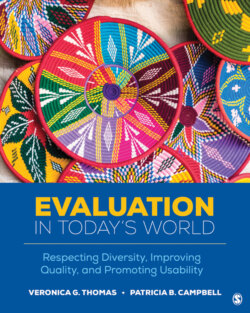Читать книгу Evaluation in Today’s World - Veronica G. Thomas - Страница 160
На сайте Литреса книга снята с продажи.
Lois-Ellin Datta
ОглавлениеFor decades, Lois-Ellin Datta has been a leading evaluation researcher and international consultant. Datta also served in many other roles during the course of her distinguished career in government, working 30 years in Washington, DC. For example, she was director of program evaluation in the human services area at the U.S. GAO’s Program Evaluation and Methodology Division and director for teaching, learning, and assessment at the U.S. Department of Education’s National Institute of Education. Over the years, Datta has also done work with the Maori in New Zealand and with Native Hawaiians.
In the 1960s, Datta served as the national director of evaluation for Project Head Start and the U.S. Children’s Bureau. Some years later while reflecting on that time, Datta (2018a) noted that Head Start’s immediate popularity was overwhelming and that increased the stakes for evaluation, while also pointing to the program’s obvious face validity and demand validity. For her, a major takeaway from those pioneering evaluation days was the importance of mixed methods, multiple approaches, and diverse designs and analyses to address the complexities and multiple dimensions of a major program like Head Start. This is a position that she has urged for the field. Datta (2018b) has stated that
In the years and evaluations that followed [after Head Start] every study was a new opportunity to think through what approaches seemed good fits with the contexts, complexities, evaluation questions, stakeholders, demining, costs, and, yes, new ideas to try out. (p. 20)
Datta’s numerous contributions to the field of evaluation include serving as editor-in-chief of New Directions for Evaluation and serving on the editorial boards of the American Journal of Evaluation, the Encyclopedia of Evaluation, and the International Handbook of Educational Evaluation, among others, and her publications have significantly advanced thinking and practice in evaluation particularly in the areas of case study methodology, evaluations in nontraditional settings, and mixed-methods evaluation approaches (Oral History Project Team, 2004). The author of numerous books and over 100 articles about evaluation, she has always been keenly focused on achieving social justice and mindful of the importance of policy.
